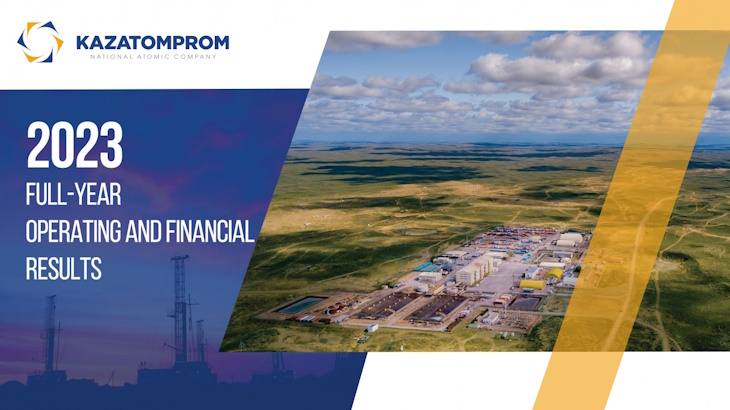
Despite geopolitical tensions in 2023, the demand for nuclear power as a stable, low-carbon energy source has "notably increased", the Kazakh national atomic company's CEO Meirzhan Yussupov said. "With Kazakhstan accounting for about 40% of the world's uranium production on an annual basis, we’re proud that at least every third nuclear reactor in the world runs on Kazakh uranium.
"The company appreciates being a part of the energy security agenda. With the continuing global geopolitical uncertainty and risks, and continuous talks on the bifurcation of the market, Kazatomprom is located in an ESG-compliant and low-risk jurisdiction and is fully capable of keeping its leadership position as a reliable supplier of natural uranium and is ready to secure utilities' needs in diversifying their supply sources."
The current global geopolitical situation saw sanctions packages and lists of sanctioned goods, works and services being constantly updated throughout the year. The company said it "constantly works" to assess and monitor sanctions risks. It has developed an action plan to minimise possible negative impacts on the company’s activities, which evolves upon identification of new risks and adapts to updates.
To date, events in Ukraine have not affected the group’s financial position, it said. The majority of its revenues are received in US dollars, and financing is also raised in US dollars, creating a "natural hedging effect" against currency risks.
Active international sanctions processes against Russian banks mean it is "not advisable" for the group to engage in operations or interact with these banks and their subsidiaries, and it has taken steps to redistribute available funds to banks that are not currently sanctioned.
The provision of services under a contract for uranium processing with Uranium Enrichment Center JSC, which is located in the Russian Federation, is currently expected to continue, but "increased attention is being paid to this issue, and risks and plans associated with compliance with sanctions regimes are being analysed", Kazatomprom said.
The group - which transports material through Russia - said it continuously monitors the potential impact of sanctions on its ability to transport material, although it is not currently experiencing restrictions on activities related to supplying its products to end customers. The Trans-Caspian International Transport Route continues to mitigate the risk of Kazatomprom's primary uranium transportation route via St Petersburg being unavailable for any reason.
Proposed US legislation to prohibit the import of Russian enriched uranium products from 2028 would not have any effect on Kazatomprom, since its primary business is production of natural uranium, the company said: "Whether shipped by Kazatomprom or its JV partners, Kazakh-origin uranium retains its origin until its arrival at a conversion facility."
"As part of the ongoing risk assessment programme, senior management analyses the impact of anti-Russian sanctions on the group's activities," the company said. "To date, the sanctions have not had a significant impact on the group's operations, although the resulting market uncertainty caused by Russia's invasion of Ukraine has resulted in significant volatility in the uranium spot price, domestic currency exchange rate and the company's share price."
The Kazatomprom group's consolidated 2023 revenue, at KZT1435 billion (USD3.19 billion) was 43% up on 2022's figure, with operating profit showing a 49% year-on-year increase to KZT681 billion. The increase was mainly due to the growth in average realised prices associated with an increase in the spot market price for U3O8; an increase in sales volumes, mainly related to additional requests from customers to flex up their annual delivery quantities within existing contracts, plus some new long-term contracts with delivery during 2023; and an increase in revenue from the sale of uranium products related to the growth of fuel assembly deliveries from the Ulba-FA fuel plant and from Kazatomprom's rare metal products segment.
Uranium production volumes for 2024 are still expected to be 21,000-22,500 tU (100% basis), as announced in January. The company said it has "contracted the relevant volumes of sulphuric acid to meet its 2024 production guidance", but added that delays in construction works at new deposits/sites "make significant uncertainties" and may affect operating performance for the year.